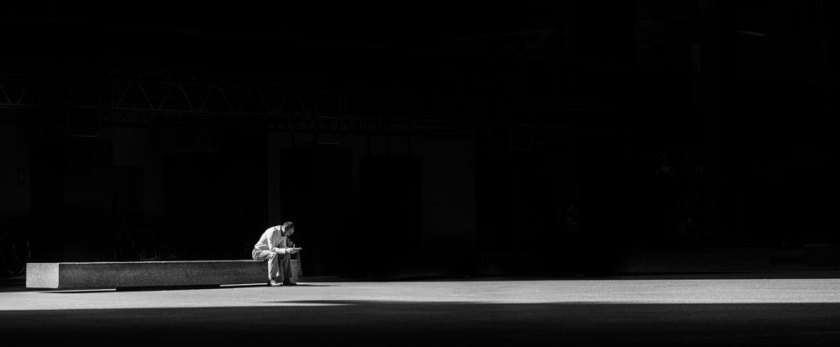
Social media users – in addition to paying attention to issues of security and privacy – should make an effort to be aware of how their social media usage is affecting their mental well-being.
Our class is currently discussing issues of safety, security, and privacy in social media. I would like to add to this a topic that I consider equally valid when considering the pros and cons of social media use: mental health.
Let’s start with the basics: I am a social media teetotaler. In this social-media-saturated world, I abstain.
To be clear, this online reticence doesn’t originate in anything nefarious. I am not conducting clandestine criminal acts in my spare time. Nor do I subscribe to conspiracy theories about surveillance programs carried out by a secret overclass of lizard people (a purely fictive threat), or think every post has the potential to bring down the doxxing-wrath of the misogynists of our modern era (a genuine threat faced by many women).
I’m simply one of those folks who suffer from an unfortunate combination of social anxiety and over-analyzing online interactions. And I am not alone.
A quick recap: Around 2015, after experiencing increasing issues with anxiety and depression, I started tapering off the amount of time I spent on sites like Facebook and Twitter. My rationale was simple – I noticed that I seemed to feel worse after visiting these sites and wanted to see if reducing my visits would also reduce my psycho-emotional distress. It did.
By 2017, I had whittled down my social media usage to nothing. It would remain “nothing” if not for my MA program, which requires us to create a personal website, blog, and tweet. Other than these MA-mandated posts, I refuse to touch social media with a ten-foot pole.
While I acknowledge that my experience is in no way representative of every human ever to log onto the internet, it is worth noting that scientific research indicates many other people my age are experiencing the same social-media-anxiety connection.
Let’s take a quick look at the top-cited peer-reviewed research on this topic from the last three years.
Up first: a 2017 study analyzed a nationally representative sample of Americans between the age of 19 and 32, comparing their symptoms of depression and anxiety against their use of multiple social media platforms.
The results? Compared against participants who used 0 to 2 social media platforms, participants who used 7 to 11 social media platforms had “substantially higher odds of having increased levels of both depression (Adjusted Odds Ratio [AOR] = 3.0, 95% CI = 1.9–4.8) and anxiety symptoms (AOR = 3.2, 95% CI = 2.0–5.1). Associations were linear (p < 0.001 for all) and robust to all sensitivity analyses.” From this, the researchers concluded that use of multiple social media platforms is independently associated with symptoms of depression and anxiety, going so far as to recommend that “it may be valuable for clinicians to ask individuals with depression and anxiety about multiple platform use and to counsel regarding this potential contributing factor.”
Another study published in the Journal of Affective Disorders highlighted a connection between social media use and anxiety in young adults ages 18 to 22. Their main takeaway: more time spent using social media was linked to a higher chance of having an anxiety disorder.
Finally, in a 2018 study published in the Journal of Social and Clinical Psychology, researchers correlated participants’ responses to questionnaires about anxiety, depression, loneliness, and “fear of missing out” (or FOMO) with data from their phones showing how much time they were spending on social media apps. Over a three-month period, the participants who limited their social media use to 30 minutes or less reported experiencing less depression and loneliness.
Following an in-depth analysis of their results, one of the researchers concluded: “Using less social media than you normally would leads to significant decreases in both depression and loneliness. These effects are particularly pronounced for folks who were more depressed when they came into the study.” (Melissa G. Hunt, quoted in this article)
So what can we learn from this? Should we all be social media abstainers?
I think that would be a case of throwing the baby out with the bathwater. For most functioning adults, using social media doesn’t immediately lead to a panic attack or feelings of overwhelming Weltschmerz.
However, I DO think that social media users – in addition to paying attention to issues of security and privacy – should make an effort to be aware of how their social media usage is affecting their mental well-being.
Every now and then, check in with yourself. How do you feel when you are on Facebook or LinkedIn or Twitter or Reddit? For that matter, how are you feeling in general? If the answer is “not great,” then it might be worth stepping away for a few hours or reducing the amount of time you’re spending in that site or app.
And—if you’re like me and notice a massive, painful correlation between scrolling through your Facebook feed and the desire to hyperventilate—it’s okay to step away permanently. Missing out on social media doesn’t mean you are missing out on life. What matters most is that you’re able to enjoy life.
References
Hunt, M. G., Marx, R., Lipson, C., & Young, J. (2018). No more FOMO: Limiting social media decreases loneliness and depression. Journal of Social and Clinical Psychology, 37(10), 751-768. https://doi.org/10.1521/jscp.2018.37.10.751
Primack, B. A., Shensa, A., Escobar-Viera, C. G., Barrett, E. L., Sidani, J. E., Colditz, J. B., & James, A. E. (2017). Use of multiple social media platforms and symptoms of depression and anxiety: a nationally-representative study among U.S. young adults. Computers in Human Behavior, 69, 1-9. https://doi.org/10.1016/j.chb.2016.11.013
Vannucci, A., Flannery, K. M., & Ohannessian, C. M. (2017) Social media use and anxiety in emerging adults. Journal of Affective Disorders, 207, 163-166. https://doi.org/10.1016/j.jad.2016.08.040
